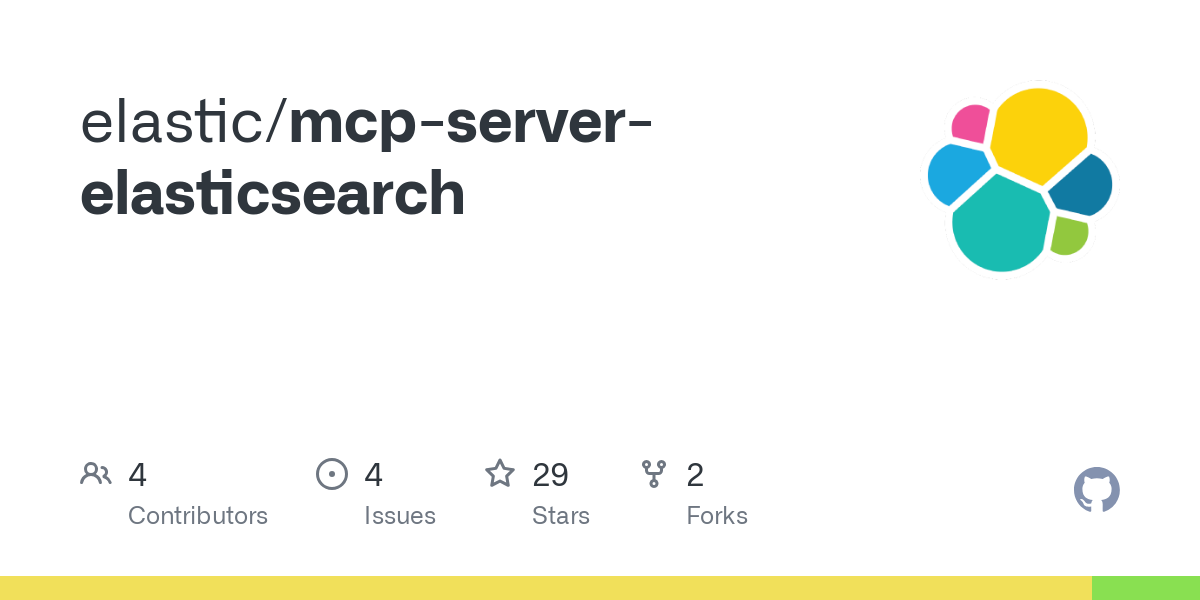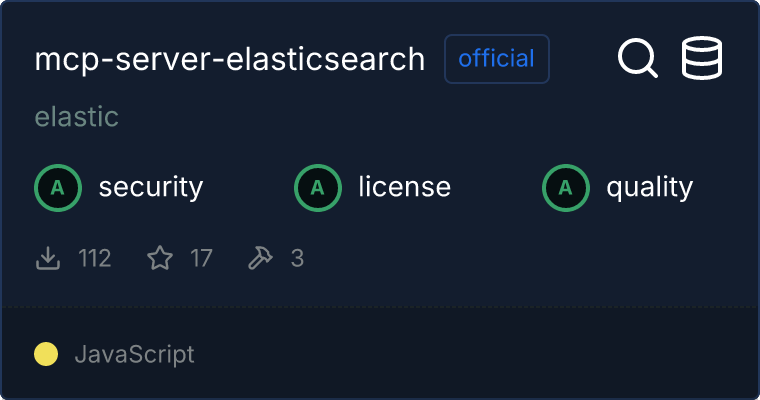mcp_server_elasticsearch
by elasticElasticsearch MCP Server: Seamless Integration with MCP Clients
The Elasticsearch MCP Server enables direct interaction with your Elasticsearch data through MCP Clients like Claude Desktop using the Model Context Protocol (MCP). This server bridges the gap between your Elasticsearch indices and natural language conversations, making it easier to query and analyze your data.
Features
- List Indices: View all available Elasticsearch indices.
- Get Mappings: Inspect field mappings for specific indices.
- Search: Execute Elasticsearch queries using full Query DSL capabilities with automatic highlighting.
Prerequisites
To use the Elasticsearch MCP Server, you’ll need:
- An active Elasticsearch instance.
- An Elasticsearch API key with appropriate permissions.
- An MCP Client (e.g., Claude Desktop).
Installation & Setup
Using the Published NPM Package
- Configure MCP Client:
- Open your MCP Client (e.g., Claude Desktop).
- Navigate to Settings > Developer > MCP Servers.
- Add a new MCP Server with the following configuration:
json
{
"mcpServers": {
"elasticsearch-mcp-server": {
"command": "npx",
"args": ["-y", "@elastic/mcp-server-elasticsearch"],
"env": {
"ES_URL": "your-elasticsearch-url",
"ES_API_KEY": "your-api-key"
}
}
}
}
- Start a Conversation:
- Open a new conversation in your MCP Client.
- The MCP server will connect automatically.
- Begin querying your Elasticsearch data using natural language.
Developing Locally
-
Use the Correct Node.js Version:
shell nvm use -
Install Dependencies:
shell npm install -
Build the Project:
shell npm run build -
Run Locally in Claude Desktop App:
- Open Claude Desktop App.
- Navigate to Settings > Developer > MCP Servers.
- Add a new MCP Server with the following configuration:
json
{
"mcpServers": {
"elasticsearch-mcp-server-local": {
"command": "node",
"args": ["/path/to/your/project/dist/index.js"],
"env": {
"ES_URL": "your-elasticsearch-url",
"ES_API_KEY": "your-api-key"
}
}
}
}
- Debugging with MCP Inspector:
shell ES_URL=your-elasticsearch-url ES_API_KEY=your-api-key npm run inspector
Example Questions
Here are some natural language queries you can try with your MCP Client:
- "What indices do I have in my Elasticsearch cluster?"
- "Show me the field mappings for the 'products' index."
- "Find all orders over $500 from last month."
- "Which products received the most 5-star reviews?"
How It Works
- The MCP Client analyzes your request and determines the necessary Elasticsearch operations.
- The MCP Server executes these operations (e.g., listing indices, fetching mappings, performing searches).
- The MCP Client processes the results and presents them in a user-friendly format.
Security Best Practices
- Avoid using cluster-admin privileges.
- Create dedicated API keys with limited scope.
- Apply fine-grained access control at the index level.
Example API Key Creation:
POST /_security/api_key
{
"name": "es-mcp-server-access",
"role_descriptors": {
"mcp_server_role": {
"cluster": ["monitor"],
"indices": [
{
"names": ["index-1", "index-2", "index-pattern-*"],
"privileges": ["read", "view_index_metadata"]
}
]
}
}
}
Troubleshooting
- Ensure your MCP configuration is correct.
- Verify that your Elasticsearch URL is accessible.
- Check that your API key has the necessary permissions.
- Review terminal output for error messages.
For additional support, open an issue on the GitHub repository.


